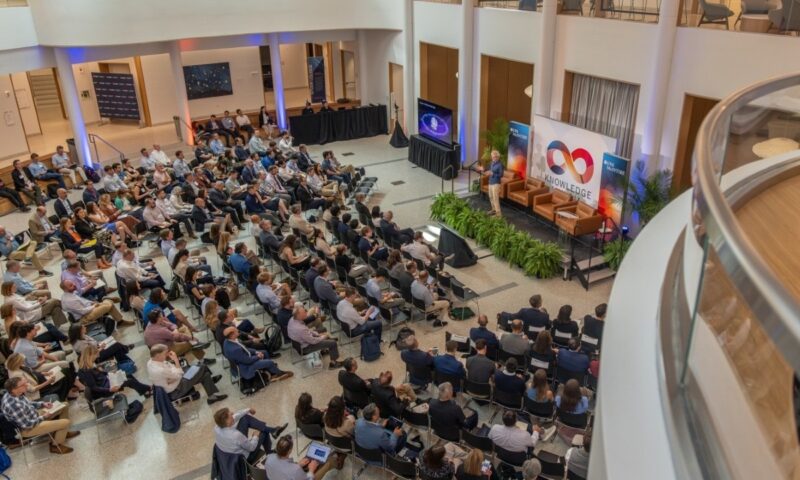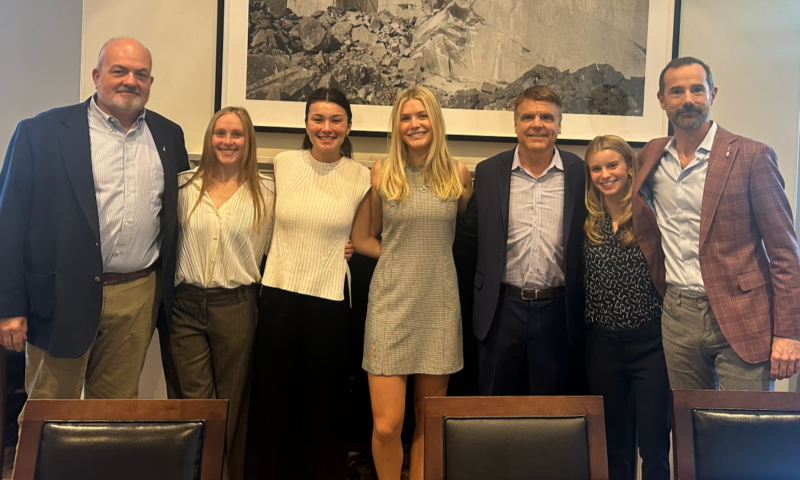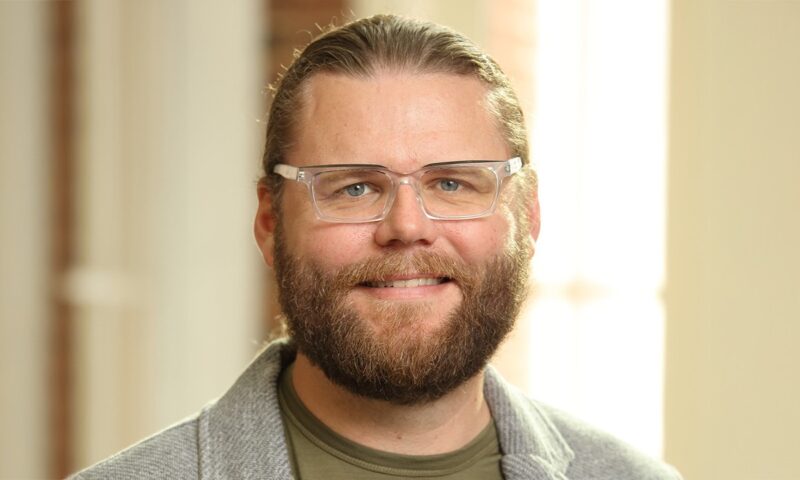In recent years, UVA and the greater Charlottesville area have been energized with a buzz around entrepreneurial activity. One reason: the establishment of the Commerce School’s Galant Center for Innovation and Entrepreneurship, which has been providing positive input for the advancement of both the local and global venture communities in many ways.
Director and McIntire Professor Eric Martin says that since launching in 2010 with a multimillion dollar endowment from Mark E. Galant (McIntire ’80), the Center has served as a nexus for innovative exploration that connects alumni, industry, and scholars with hundreds of students from across the University through a combination of education, mentorship, and real-world entrepreneurial experiences.
Concepts Converge
Months before the Galant Center came to be, Martin had begun preliminary work for establishing a specialized entrepreneurship study track for the B.S. in Commerce Program in hopes of growing McIntire’s commitment to education in the venture and innovation spheres. As serendipity would have it, Galant, a deeply committed philanthropist at the School, had independently approached then McIntire Dean Carl Zeithaml about his idea for creating a center to explore and promote the subject.

Mark and Cindy Galant
Martin flew to Vero Beach, FL, to meet with Galant and his wife, Cindy, who, Martin explains, had already long been active and engaged participants together with the School.
“We had this long conversation about vision, what we were thinking, and what was going to happen with the Center,” he says, conceding that while a small group at the School was motivated by an intellectual interest to build it, Galant’s intense drive to see it established served as a game changer, both in terms of making the initiative a top priority for McIntire and the unprecedented quickness with which it was completed.
“It was February, and we actually got everything in place and approved for it to be launched the next fall, which is light speed,” recalls Martin.
Impelled by a desire to put the Commerce School on the map as a destination for cultivating the skills of future generations of aspiring entrepreneurs, Galant wanted to infuse his expertise and funding to help expand opportunities both within the McIntire curriculum and outside of the classroom.
In Martin’s experience, Galant is unusual for his approach to his own work as a 35-year Wall Street veteran and finance industry entrepreneur. The result of that perspective ultimately led to his commitment to advancing his Center concept for the betterment of the entire University.
“All I ever wanted to do was be an entrepreneur,” says Galant, former member of the McIntire Advisory Board and current member of the McIntire Foundation Board of Trustees. “When I was fortunate enough to be in a place where I could truly make an impact through philanthropy, I knew I wanted to direct it to McIntire to launch an entrepreneurship center to serve all of UVA.”

Roots Natural Kitchen
Challenge Accepted
One early differentiator for the Center and its mission took shape with the introduction of the Galant Challenge. The high-profile pitch competition in the vein of TV’s “Shark Tank” connects seed- and early-stage ventures with potential investors. Since 2012, the annual event has funded ventures millions of dollars in capital. Its successful participants have included alumni innovating in many fields, ranging from Alvaro Anspach (McIntire ’15) and Alberto Namnum’s (McIntire ’13) health-minded, fast-casual restaurant group Roots Natural Kitchen, to the real-time geolocation platform X-Mode, created by Josh Anton (McIntire ’14).
“What we want to do with the Challenge is look for opportunities where we can provide service to the community and bring people in who are not currently on Grounds,” explains Martin. “Many schools don’t have the resources we do to host that kind of event, which is really more like a demo day. It’s not a competition where people get a $25,000 check. It’s equity and real backers.”
While originally focused solely on the greater UVA community, the Galant Challenge has already hosted a few other schools from the Commonwealth, and is now poised to grow beyond the University. Looking ahead, Galant and Martin are aiming to reorient it to embody a type of national collegiate demo day, inviting universities from across the country to participate.
“If you look at the amount of funding that gets provided on an equity basis from this one event and compare it to single events at other schools, it would be among the top in the country every year. It’s hundreds of thousands to a million dollars—sometimes more,” Martin says, explaining that the interest and impact generated by the event have the potential to elevate the image of UVA and Charlottesville as a national center for entrepreneurship.
Though the 2021 edition of the Galant Challenge was virtual, necessitated by previously established COVID restrictions, Martin hosted an esteemed panel of judges and partners who pledged upwards of $1.8 million, subject to due diligence and final negotiation. The judges, which included Galant and 2019 E&Y Entrepreneur of the Year for the Mid-Atlantic region and former UVA football defensive back Doug Duenkel (McIntire ’92), welcomed Broadway Angels and Project Glimmer founder, Sonja Hoel Perkins (McIntire ’88), as well as Jim Cheng (Darden ’87) of non-UVA-affiliated affinity group Cav Angels and Darden School of Business’s own Damon DeVito.
Future plans for the Center’s hallmark event will potentially welcome back live audiences back to Grounds—along with a more extensive group of hopeful entrepreneurs.
Shaping Comm School Curriculum
The excitement generated by the high-profile pitch event is only one avenue by which the Center has brought innovation and entrepreneurship to the foreground of important subjects taught, researched, and put into real-world practice at the Commerce School.
“This is the part that’s really a little bit unusual. Centers and academics are not always aligned. They’re not one and the same. But for us, they have always been integrated,” says Martin.
One of the first classes developed, Martin’s Capstone course, taught students to work through the commercialization of business concepts and explore avenues into launching legitimate ventures. He also says the groundbreaking class paved the way for offering a full 12-credit Entrepreneurship Track within the School’s five specialized undergraduate concentrations.
“We started bringing together electives like a Project Management course and others within McIntire that would apply to the track. The Center provided a nexus,” Martin says, noting that Professor Brendan Richardson began teaching the Venture Capital class around that time as well, a course he still teaches today. Martin says that Richardson ultimately became part of the Center, co-teaching several classes with him and helping to expand the School’s practitioner talent in the field, advancing the Center’s academic efforts.
“We started including entrepreneurial and innovative learning into the Integrated Core Experience roughly three years ago,” he says, pointing out how tools like the strategic management chart Business Model Canvas, which is drawn from Entrepreneurship coursework, now shows up in the curriculum that undergraduate Commerce students learn.
Yet for all of their successes, Martin insists that the Center has never had the intention of locking up innovation and entrepreneurship for itself.
“We think it should be something that’s baked into a lot of what the Comm School provides students—and that can come in any class,” he says, noting that principle extends to lending his expertise, along with that of colleague Professor Chip Ransler, to sessions and lectures in introductory courses such as Understanding the World of Business for non-Commerce majors, the prerequisite undergraduate course Foundations of Commerce, and classes in the M.S. in Commerce Program.
Professor Bevin Etienne who teaches the new venture Startup Class, an introductory course on the subject geared toward a first- and second-years, has also generated great interest and impact for all University students with Social Entrepreneurship in Small Island States. Focusing on Dominica and the challenges entrepreneurs face, his on-location class highlights the crucial role of social ventures to advance sustainable growth and development on the Caribbean island nation, mixing site visits to enterprises with guest lectures by Dominican social entrepreneurs and government officials.
Yet perhaps the best example of that open-minded, wide-ranging point of view positively impacting UVA students is the Entrepreneurship Minor. Launched in 2015, and hosted at McIntire, the program of study connects coursework from a diverse selection to offer concentrations in Innovation in Business, Social Entrepreneurship, and Technology Entrepreneurship. The 15-credit program provides innovation studies in courses as diverse as Persuasion and Influence, Applied Real Estate, and Special Topics in Systems and Information Engineering.
And indicative of the program’s ability to foster strong connections with alumni and elicit their continued participation, Duenkel has been teaching Capstone with Martin since the fall of 2019. Duenkel’s interest in teaching was sparked when he was asked to speak in class about a case in his area of expertise. “From day one I was in favor of bringing back as many entrepreneurs as possible to speak with the students about their successes and struggles. The ability of entrepreneurially minded students to see and interact with people of similar vision and drive, but have more experience in the real world is invaluable,” says Galant.
Martin says that, all told, about 1,500 students each year are reaping the benefits of an integrated Entrepreneurship curriculum.
In addition to generating increased interest in its main subjects on Grounds, launching the Center became a vehicle for reinvigorating McIntire’s Silicon Valley connections after a decade of dormancy. The initiative added immediate credibility to the School and served as a bridge to reconnect with West Coast alumni at inventive tech-related firms. Led by Richardson and Assistant Dean for Development and Alumni Engagement Nola Miller, students visited the fertile startup ground of the Bay Area, being hosted at Facebook, YouTube, and other major players in Silicon Valley.
Popular Programming
Beyond curriculum, the Galant Center has also served as a catalyst for programming outside of the University, for both extracurricular interests and alumni engagement.
Forge (formerly HackCville) is one such example. The Center had an instrumental role as a founding partner for the nonprofit, project-based, stand-alone school, with the Galant Center providing initial funding and, early on, working directly with students to provide expertise. As Forge grew, Martin says a symbiotic relationship allowed many UVA students to apply their classroom work to the projects they undertook off Grounds.

Nancy Twine
The Center has also been engaging both alumni and the greater Charlottesville community. One of its first forays into community-wide programming was the co-sponsorship of McIntire’s 2014 Spring Symposium, “Beyond the Big Idea: From Garage Startups to Global Empires.” With a keynote delivered by Under Armour Founder, Chairman, and CEO Kevin Plank, followed by panel discussions featuring Galant, along with Nancy Twine (McIntire ’07), Founder of Briogio, Andy Forch, Co-Founder of Huckberry (McIntire ’07), and others, the event delved into the risks and rewards of ventures as well as the intricacies of generating innovation within established corporations.
The Symposium served as one of the Center’s initial explorations on the topic geared toward alumni and the community at large. Over the last five years, it has hosted topical events ranging from an entrepreneurship dinner in Chicago, IL, and conversations on “The Business of Healthcare,” to impact panels on innovation and various regional startup scenes in San Francisco, CA, Tysons, VA, Cambridge MA, Charleston, SC, and New York, NY.
Since May of 2020, the Center has also had a hand in a slew of virtual events that have included happy hour-style sessions with entrepreneurs who are currently innovating in the food, finance, tech, and sports fields.
The Mark of an Innovative Mindset
Martin says that, though the Galant Center is only one player among many interested in entrepreneurship at UVA, its mission is somewhat different: to provide students with the skills and experience to operate at the intersection of critical thinking and creativity.
“We have a lot of students who are focused innovation going into corporate roles developing new products, services, and business models—as opposed to becoming founders,” Martin says, noting the center’s renaming to the Galant Center for Innovation and Entrepreneurship to incorporate the type of innovative mindset that has been applied to positions with other organizations. “We are very proud of our founders, but we don’t only focus on their number; we care equally about the enduring impact we have with students broadly.”
He mentions that he’s continually made aware of the lifelong impact of the Center’s work. “I still keep up with so many of our graduates. I hear regularly—on a monthly basis—from students we taught in 2010. Many of them have continued to work in entrepreneurial, venture-related, and innovation-related jobs.” For Martin, he is gratified by the fact that the Center has helped to foster that action-oriented view that his former students, now alumni innovators and entrepreneurs, rely on to bring change to their ventures, the firms they work for, and society.
“My hope was that the Center would be a catalyst for undergraduate entrepreneurship education, both classroom and experiential,” Galant says. “I envisioned a place that would prepare students to found and run their own companies, as well as equip them to be innovative leaders within existing organizations. I am extremely proud of the progress we have made throughout the last 13 years and look forward to all that we will accomplish together in the future.”



